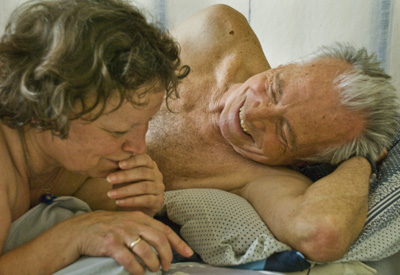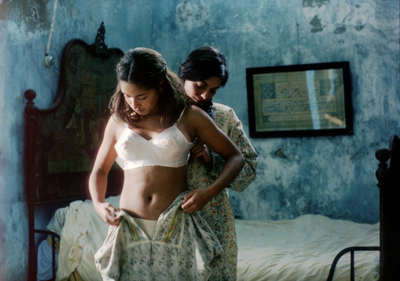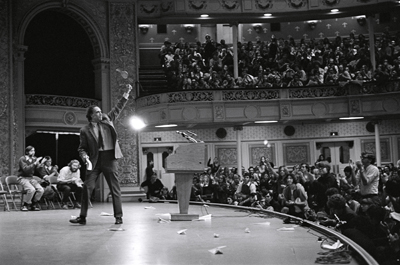Here’s a look at all of our recommended films for SIFF’s second week, May 27 through June 2. Follow all our SIFF coverage on our special SIFF page, updated daily with reviews, news, and gossip.Published on May 26, 2009

Mothers & Daughters: In seventh grade, I broke my wrist badly enough that it required a cast up to my shoulder. For six weeks I had to depend on my mother to wash my hair. We did not bond during these sessions. Oh, no. We fought constantly. The word aEœbitchaE was tossed around as we fought over the shampoo, how hard she was pulling, even the best way to keep the plaster dry. But my mother is also the person who cheered me on when I quit a lucrative job in marketing, packed my Toyota, and drove to the rural Southwest with a vague notion of becoming a journalist. In such relationships, itaE™s easy for filmmakers to either over-dramatize the potential mutual loathing or play up the BFF aspect. Carl Bessai avoids both extremes by having his talented Canadian cast improvise three alternating scenarios in a kind of faux documentary. Two of the segments are winners. Brenda (portrayed with heartbreaking subtlety by Gabrielle Rose) and her daughter reconnect after BrendaaE™s husband leaves her. In the third scenario, a house painter who once gave up her child for adoption becomes a late-life mother/mentor figure to a younger, pregnant single women (who, as it turns out, was adopted herself). The resulting mini-drama elegantly walks the line between heart-warming and sappy. Take your mom. (NR) REVIEW BY LAURA ONSTOT Uptown: 7 p.m., Thurs. May 28 (Also: 4:15 p.m. Fri., May 29.)

The Overbrook Brothers: As indie road comedies go, John BryantaE™s Overbrook Brothers is about perfect. Centered on a bombshell familial revelation that forces two quarreling adult brothers into a used Lincoln and on the long road from Colorado to Texas, virtually every scene belongs to Mark Reeb, who plays Todd, the chief egger-on of the sibling pair. Reeb so nails his hilarious character that the movieaE™s only real shortcoming is that it isnaE™t 20 minutes longer, to give Reeb more room to run. ThataE™s not to take anything away from Nathan Harlan, the more subdued, artsy brother, Jason, who canaE™t help but stoop to ToddaE™s level time and again. In both looks and deadpan demeanor, Harlan is reminiscent of Jason Bateman, the ultimate comedic straight man (whoaE™s usually funnier than his not-so-straight collaborators). If thereaE™s any justice in the cinematic world, Reeb and HarlanaE™s pairing will go down as one of the greatest of its genre. The filmaE™s climactic scene also features one of the more originally shocking penile gross-out sequences ever captured onscreen. (NR) REVIEW BY MIKE SEELY Harvard Exit: 9:30 p.m., Fri. May 29 (Also: Pacific Place, 3:45 p.m. Sun., May 31.)

Wallace & Gromit in aEœA Matter of Loaf & DeathaE: Presented as part of the aEœFamily Picture ShowaE package of shorts (other programs play SIFF Cinema all weekend), the latest claymation charmer from Aardman Animations is definitely worth the early wakeup call. Cheeky pun-filled fun, the half-hour adventure has our heroes encounter a serial killer! And this secret menace is dispatching all the townaE™s bakers, just when our boysaE™ new business of Top Bun is, ahem, rising. What will theyaE”forgive meaE”dough about it? Ever unflappable Gromit is silently disapproving (as ever) when Wallace thinks heaE™s found love. Add to that a hot-air balloon, a bakery assembly line run out of control, and WallaceaE™s eventual declaration that, aEœIaE™ve got a bomb in me pants!aE (A line that should be used at least once in every movie.) A spirit of old Ealing Studios murder comedies runs through Loaf & Death, but some things never change. Among the old cassette tapes in the ladsaE™ delivery van isaE”get ready for itaE”The Hound of Music. (NR) REVIEW BY BRIAN MILLER SIFF Cinema: 11 a.m., Sat. May 30.

The Maid: Not many films, or actresses, would let the central female role of a movie be underestimated for so long. Blank-faced, bone-tired, and implacable, Catalina Saavedra delivers a wonderful, slow-brewing performance as Raquel, a 41-year-old Chilean maid whoaE™s served one family her entire working life. Bustling around her, the haute bourgeois Valdes clan is both appreciative of and indifferent to her constant labors. They own an expensive Santiago home with swimming pool; the wife is a university professor, while her husband plays golf and builds model ships; and itaE™s Raquel who organizes the lives of their four kids. SeA±or and SeA±ora Valdes need Raquel, but sheaE™s replaceable. (Also: She just doesnaE™t seem very happy or appreciative. DoesnaE™t she ever smile?) And when loveless, childless Raquel suffers some fainting spells, the Battle of the Maids begins. Hired helpers and potential replacements dare to usurp her place, and she fights back with cunning. Writer-director SebastiA¡n Silva dedicates this film to the two maids from his childhood home, so youaE™ve got to assume some of RaquelaE™s strategems are true. And some are very, very funnyaE”though the movieaE™s not strictly a comedy. Rather, itaE™s a powerful character study of delayed self-realization. And one of the best titles IaE™ve seen at SIFF so far. (NR) REVIEW BY BRIAN MILLER Pacific place: 9:30 p.m., Sat. May 30 (Also: 1:15 p.m., Sun. May 31.)

Cloud 9: Elder porn, let alone elder sex, has become kind of an ewww! punch line. But, letaE™s face it, weaE™re all headed there one day or another. ThataE™s why the bracingly frank Cloud 9 is so remarkable. We meet a normal German woman in her 60s, a wife and grandmother, whoaE™s contented enough with her husband. That changes when she, a seamstress, visits one of her clientsaE”a septuagenarian bicycle coach, still pretty fit and vigorous, evidently a widower. As many SIFFgoers will know from personal experience, sex on the floor with a stranger can happen to anyone, at any age. Cloud 9 is hardly pornographic, though Ursula Werner and Horst Westphal deliver brave, unashamed performances. Sagging bodies donaE™t mean sagging passions. aEœIt doesnaE™t matter if IaE™m 16 or 60 or 80,aE says the seamstress. After three decades of dull, predictable married life, sheaE™s been given a second chance at love, and she takes it. But her actions have consequences, and Cloud 9 acknowledges how love can be complicated, and painful, for all parties affected. REVIEW BY BRIAN MILLER Uptown: 11 a.m., Sun. May 31(Also: 7 p.m. Tues. June 2.)

The Wedding Song: This French film is set in 1942 Tunisia during the six-month German wartime occupation, when the Nazis electrified ethnic tensions between Muslims and Jews that had already been buzzing since the French colonization began. Despite their fierce love for each another, best friends Myriam (Jewish) and Nour (Muslim), both desperately poor, both awaiting marriage, are swept into the rising hatred. Filmed almost entirely through cool blue gels, the film dwells on intimate scenes from a vanished epoch: women grooming one another in the public baths, the clack-clack-clack of a sewing machine treadle, a crowd of mothers and aunts ululating joyously outside the wedding chamber when a bloody gown is delivered. There are moments when the film is overtaken by social responsibility, others when the sensuous, self-proclaimed femininity of Karin AlbouaE™s directing becomes soft-core porn (a depilation scene in the public baths may leave you equally aroused and grimacing). Albou, a member of FranceaE™s Tunisian Sephardic community, is searching for the roots of virulent anti-Semitism in the Muslim worldaE”and finding them in Christian Europe. REVIEW BY JONATHAN KAUFFMAN Uptown: 6:30 p.m., Sun. May 31 (Also: 4:30 p.m. Mon., June 1.)

William Kunstler: Disturbing the Universe: William Kunstler was the kind of lawyer who got J. Edgar HooveraE™s panties in a twistaE”the FBI even rented an apartment across the street to monitor him. Kunstler represented radicals and disenfranchised parties of every stripeaE”from Black Panthers in Chicago to Indians in Wounded Knee. But he later went on to defend Leona Helmsley, as well as a cat charged with crimes against humanity. His daughters, Emily and Sarah Kunstler, endured daily protests outside their home and grew weary of their late fatheraE™s attention-hungry ways. This documentary is their attempt to come to grips with their fatheraE™s legacy, warts and all (he died in 1995). But the film is less a study of KunstleraE™s seeming contradictions than it is an examination of the series of events that radicalized him, turning him from suburban, liberal lawyer to fist-raising revolutionary. And with the help of remarkable archival footage (including white police officers celebrating with shouts of aEœwhite poweraE after killing inmates in Attica Prison), the Kunstlers tell this story quite well. Kunstler was a man of extraordinary talent; few could achieve what he did. But what the film shows, and what he wanted people to recognize, was how ordinary his outrage was; youaE™d feel the same way if you allowed yourself to see what he saw. Note: Emily Kunstler is expected to attend both screenings. (NR) REVIEW BY DAMON AGNOS SIFF Cinema: 4:30 p.m., Sun. June 2 (Also: 7 p.m. Thurs., June 4.)

LailaaE™s Birthday: Toward the end of Palestinian filmmaker Rashid MasharawiaE™s tragicomedy about daily life in his West Bank hometown, the frustrated protagonist shakes his fists at the heavens and blames the 60-year Israeli occupation for his woes. ThataE™s the only direct polemic in LailaaE™s Birthday, and this beguiling second feature, after the respectfully received Ticket to Jerusalem, is all the better for keeping its head close to the ground of the surreal business of getting through the day in Ramallah. Veteran Israeli-Arab actor Mohammed Bakri (whose son, Saleh, played the hunky young Chet Baker fan in The BandaE™s Visit and has a small, but significant, role here) plays Abu Laila, an unemployed judge eking out a living as a taxi driver, who heads out to work at the beginning of the film, charged with bringing home a gift and a cake for his little girlaE™s birthday. Prickly, unbending, and a rigid follower of rules, Abu Laila is hopelessly ill-equipped for the bedlam of a city plagued by corruption, inefficiency, and the occasional missile from across the border. Part Tati, part Chaplin, part absurdist satire in the manner of Palestinian director Elia Suleiman (Chronicle of a Disappearance), LailaaE™s Birthday is beautifully shot and overlaid with a spare, lyrical score that lends rueful emphasis to MasharawiaE™s exasperated fidelity to a chronically malfunctioning city. (NR) REVIEW BY ELLA TAYLOR Pacific Place: 7:30 p.m., Sun. June 2




